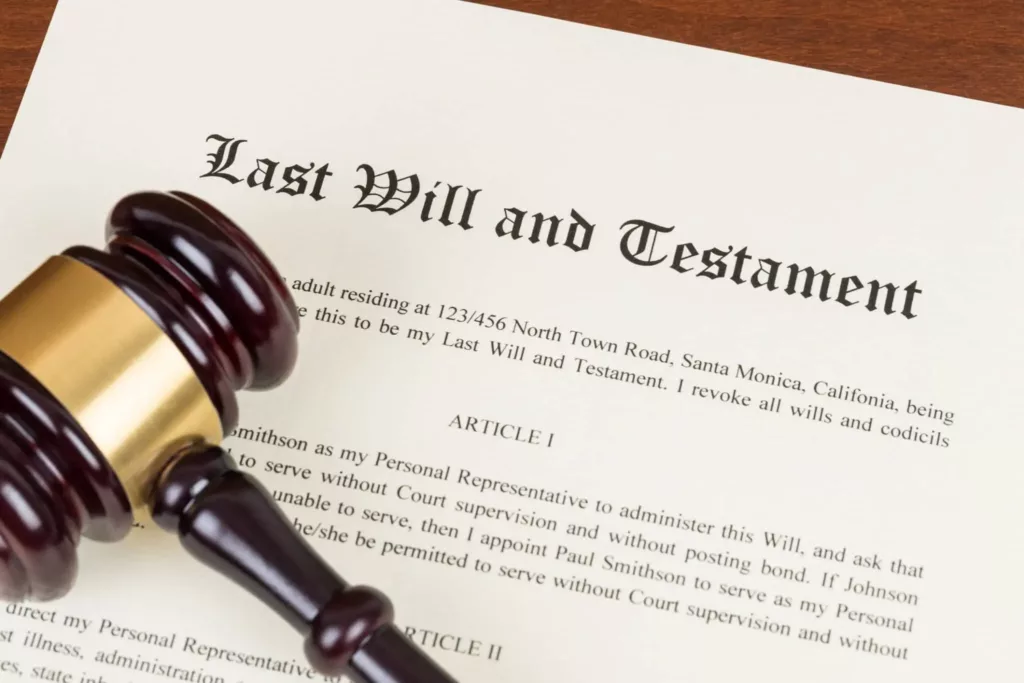Probate & Estate Administration
The team of experienced estate and probate attorneys at McDaniel Wolff understand what you’re going through following the death of a loved one. What we can do and what we do well, is help you with the legal aspects of an estate so you can focus on your family.
If we can assist you with the administration of a trust or estate, please call or email one of our attorneys featured on this page, or submit an inquiry via our contact form available here.
Settling an Estate in Arkansas

When an Arkansas resident dies, a legal proceeding to settle the person’s estate is often required. This proceeding, whether the person dies with or without a will, is generally referred to as “probate”, and it typically takes place in the circuit court of the county where the decedent resided.
The probate proceeding will involve several steps to fully settle the affairs of the deceased party. These steps generally include the following:
- Locating the will and submitting it to the probate court to determine its validity;
- Appointing a “Personal Representative” who will be the party responsible for carrying out the estate administration;
- Locating the assets that are subject to probate administration;
- Notifying creditors of the decedent and giving them an opportunity to present claims against the estate;
- Paying valid claims of creditors;
- Filing an inventory and accounting with the probate court; and
- Distributing remaining assets to the estate beneficiaries.
Our probate attorneys will prepare the necessary court filings and guide the personal representative through the probate process.
Determining if Probate is Necessary
One of the first steps in the probate process is to determine if the assets owned by the decedent are subject to probate administration. Some assets pass to others automatically by operation of law without a probate proceeding, and other types of assets do not. Our team of Little Rock probate attorneys can assist you with evaluating whether assets are subject to probate and whether a probate proceeding is necessary.
Non-probate assets are typically those owned jointly with other individuals, or those that have a named death-beneficiary associated with the asset. Some examples of non-probate assets include the following:
- A life insurance policy with a named beneficiary;
- Checking or savings accounts in a bank with a payable-on-death or transfer-on-death designation;
- A retirement account (such as a 401(k) or IRA) with a named death-beneficiary;
- Real estate which transfers by operation of a beneficiary deed;
- Assets titled in a manner providing rights of survivorship, such as a “joint tenancy” or “tenants by the entirety”; or
- Assets held in a living trust at the time of the decedent’s death.
In each of these cases, someone is named as the person who will receive the assets after the owner dies, and the property transfers to such person(s) by operation of law without the requirement of a probate process. Alternatively, if an asset it titled solely in the decedent’s name and does not have a named death-beneficiary associated with the asset, the asset may be includable in the probate estate.
If an estate is relatively small in value, it may be possible to avoid the full probate process even if there are probate assets. In Arkansas, you may be able to significantly shorten the process if the total value of the estate is less than $100,000 and there are no known creditors of the estate. In such instances, an “Affidavit for Collection of Small Estate” is filed with the circuit court in the county where the deceased resided at the time of his or her death. The affidavit must state, among other things, that the conditions referred to above are true. Our probate attorneys can work with you to determine whether a small-estate process is available.
How Long Does Probate Take?

It is difficult to predict with certainty the amount of time that it will take to complete probate administration because each case can present different facts and circumstances. Typically, a probate case without controversy will take at least seven to eight months to complete. The primary reason it takes so long is that Arkansas law generally requires that creditors of the estate be given at least six months to present their claims against the estate.
In some cases, probate administration can take much longer if:
- The validity of the will is disputed;
- There are numerous creditors of the estate;
- There is ongoing civil litigation involving the decedent;
- There are disputes over who is entitled to share in the estate;
- The estate is required to file a federal estate tax return; or
- More complicated assets such as real estate or a closely-held business interests are involved.
Our probate attorneys can evaluate the circumstances surrounding an estate and advise you at the onset of administration as to how long a proceeding is expected to last.
Testate and Intestate Succession in Arkansas
Probate proceedings involve the settling of a decedent’s estate in both instances where a person dies with or without a last will and testament. When a person leaves a last will, the person is generally referred to as having died “testate” and the terms of the will guide various elements of probate such as naming the executor, appointing guardians of minor children, and specifying what authorities the executor has with respect to the estate administration. If the will is found to have been properly executed, the estate will be distributed in accordance with the directions contained in the will.
If the deceased did not leave a last will, the deceased is considered to have died “intestate” and his or her estate will be distributed in accordance with Arkansas’ intestate succession statutes. In such instance, property passes to the intestate’s heirs as determined under such statutes, subject to statutory allowances for a surviving spouse. The share distributable to an intestate’s heirs and surviving spouse depends on numerous circumstances, such as the length of the marriage and whether there are surviving children. If your loved one died without a will, an experienced Arkansas probate attorney can advise you as to how an intestate’s estate is to be distributed under the Arkansas Probate Code.
When Is Probate Litigation Necessary?

Whether litigation in connection with an estate is necessary will depend, at least in part, on the size and complexity of a deceased individual’s estate, as well as the circumstances surrounding the execution of the decedent’s will. Beneficiaries or heirs may take issue with the way in which the assets are to be allocated among them. Concerns may arise regarding the mental capacity of the decedent at the time the will was created. There also may be issues of whether the decedent was unduly influenced to make a will that was not truly theirs, but rather reflected the wishes of someone else.
Under Arkansas law, a will can be contested due to:
- Failure to have the will properly signed or witnessed;
- The deceased lacking the requisite mental capacity at the time they signed the will; or
- A will that was signed under conditions of fraud or undue influence.
In the event of a will contest, the Arkansas Probate Code sets forth certain procedures that will govern how such issues will be litigated. Our team of Little Rock probate attorneys have mastered such procedures and have been successful in defending numerous will contests as well as prosecuting claims to get wills declared invalid. Contact us today if you or a family member have reason to believe that your loved one’s will was not made in accordance with their true desires.
Avoiding Probate Administration in Arkansas
To avoid the complicated, time-consuming and occasionally costly process of probate, many people take time during their lives to implement estate planning devices which will eliminate the need for their loved ones to go through probate administration. The key to diminishing (or even avoiding) the time and expense of probate is to reduce your probate estate. This can be done by using numerous techniques, including the following:
- Establishing a trust to hold your property;
- Making sure that your checking, savings and investment accounts have payable-on-death or transfer-on-death designations, or are titled in the name of a trust; or
- Making sure that your retirement accounts (such as a 401(k) or IRA) have a named death-beneficiary.
Our probate attorneys are well-versed in estate planning techniques that can avoid the need for probate administration.
Guardianships in Arkansas
In Arkansas, probate courts also serve as having jurisdiction over guardianship cases involving individuals who are still living but have become legally incapacitated for various reasons. Our probate attorneys have decades of experience handling guardianship matters and regularly assist clients with obtaining guardianships in probate courts throughout Arkansas.

A guardianship is a relationship created and monitored by an Arkansas probate court that takes away legal rights from an incapacitated person (referred to in the court proceedings as the “ward”) and gives those rights to another person (the guardian) to use for the benefit of the ward. Legal incapacity can be established based on physical or mental conditions. An individual may be determined to be incapacitated if they are unable to provide their own food, clothing, or shelter, and/or unable to take care of their own physical health, or manage personal financial affairs. Our probate attorneys can work with you to determine whether the circumstances surrounding your loved-one warrant a guardianship.
There are variations of guardianships, some are short term, and others are full-term. The two types of guardianships are a guardianship of the person and/or the estate. In a guardianship of the person, the guardian has control over the ward’s personal matters, including medical, housing, and educational decisions. In a guardianship of the estate, the guardian has control over the ward’s property and finances. A guardian commonly serves as both guardian of the person and estate. Our probate attorneys can work with you to determine which kind of guardianship is appropriate for your circumstances.
In Arkansas, most guardianship cases involve incapacitated adults. For example, a guardianship will enable a person to have legal authority to mange the financial affairs of an elderly individual who sufferers from a disability rendering them mentally incapacitated, such as Alzheimer’s and dementia. Other guardianship cases may involve minors or those with special needs. For example, a child left with a large inheritance may need assistance from an adult to properly manage and preserve it, or there may be a situation where a person is taking full-time care of a minor who is not their biological child and needs legal authority to make education and healthcare related decisions for the minor.
If we can assist you with a guardianship, please call or email one of our probate attorneys featured on this page, or submit an inquiry via our contact form available here.




